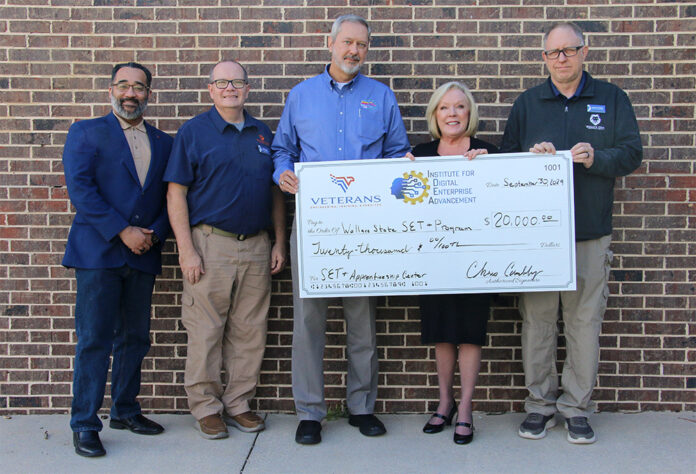
HANCEVILLE, Ala. – Wallace State Community College’s Systems Engineering Technology (SET) degree program is set to expand, thanks to a $20,000 grant awarded by the Institute for Digital Enterprise Advancement (IDEA). The funding will be used to further promote the SET program and support the development of a work-based learning apprenticeship center on campus, enhancing hands-on opportunities for students.
Executive Director of IDEA Chris Crumbly visited the Wallace State campus to personally present the grant to the Computer Science department. Crumbly explained the significance of the grant and IDEA’s mission in promoting model-based system engineering (MBSE) education.
“We knew that this model-based system engineering was coming, but we also knew there were not enough people out there that knew how to do it, so we put IDEA together to move into the community colleges. We are working to expand beyond where we started in Huntsville, and Wallace State was the next logical choice,” said Crumbly. “We were able to come up with a grant of $20,000 to help the Computer Science department create a work-based learning lab. Thanks to Congressman (Robert) Aderholt(, R-Alabama), who was able to give us some additional funding to move this program to Wallace State, we know that we can work with these students to have remote jobs here in Hanceville and work with some of the more high-tech companies in Huntsville, with companies like Airbus down the Mobile, with places in Atlanta and everywhere that there is a need for model-based system engineering. We know that we can do that remotely and Wallace State is helping to really show that potential.”
Crumbly highlighted how the grant opens new possibilities for students to engage in high-tech STEM careers without having to relocate.
“The most exciting thing about this grant is being able to prove that we can teach anywhere in Alabama,” Crumbly said. “These students can go to school where they live and be a part of a high-tech STEM career. I think this is a fabulous way to test that right here in Hanceville.”
Wallace State Computer Science Department Chair Terry Ayers expressed enthusiasm for the grant, emphasizing the importance of the SET program in today’s evolving industry.
“We are one of the very few colleges in the state currently offering the Systems Engineering Technology pathway,” said Ayers. “This program will save companies a lot of money by maintaining one source of truth for complex projects. Instead of having five, 10 or even 100 different versions of what is true about a project, systems engineers can rely on one up-to-date model, ensuring consistency across teams. Our first cohort is set to graduate this coming year, and we hope to see the program grow even more thanks to this grant.”
Ayers further explained that the ability for students to work remotely makes the program even more attractive.
“The job itself can be done remotely,” Ayers said. “Students can log into a secure system and maintain it from home or another location, without needing to be on-site next to engineers.”
A program designed for the future of engineering
Wallace State’s SET program provides a focused two-year associate degree pathway for students interested in model-based systems engineering (MBSE). MBSE is a methodology that allows engineers to design, analyze and manage complex systems through visual models, ensuring collaboration and reducing errors across industries such as aerospace, automotive, and defense.
Students in the SET program learn essential computer programming, systems modeling and database skills necessary to coordinate large-scale engineering projects. Courses offer students hands-on experience with the tools needed for these roles. The program, developed in partnership with IDEA, equips students with knowledge that directly translates into high-demand positions in industries like defense and aerospace, where precision and efficiency are critical.
Greg Knight is a computer science instructor and the lead SET instructor at Wallace State. Knight emphasized how MBSE can reduce costs and shorten project timelines, particularly in the defense and aerospace industries.
“With systems becoming more complex, the time to deliver them has increased to the point where it’s almost unaffordable,” Knight said. “Model-based Systems Engineering, which is what we are teaching here, allows companies to shorten the timeline, save taxpayer money and still produce world-class defense and aerospace products.”
In the SET program at Wallace State, students have the option to pursue a short-term certificate in programming after completing 12 hours of coursework in C++, Java and Python coding languages. Additionally, industry partners play a significant role in offering paid internships and apprenticeships to students, ensuring they gain real-world experience before entering the workforce.
VETS partnership expands veteran opportunities
Deputy Director of Training for Veterans, Engineering, Training and Software (VETS), Vernon James, was also on hand to present the grant to Wallace State’s Computer Science department. James said he sees the grant as a vital opportunity to address the growing demand for systems engineering skills.
“This grant is an excellent opportunity to assist in building a broader base of supply to meet the growing demand for model-based systems engineering throughout the state of Alabama and the country,” said James. “It is a growing field.”
VETS, based in Huntsville, works together with IDEA and collaborates with educational organizations across the United States. VETS works closely with the federal government and the Department of Defense to prepare veterans for high-demand roles in MBSE, ensuring they have the tools and knowledge necessary to succeed. James, a product of the Department of Defense’s SkillBridge program, shared how his own experience shaped his journey into the industry.
“The SkillBridge program allowed me to intern with VETS prior to coming on board as a full-time employee,” he said. “It provided a bridge between my time in uniform and my work with industry. This grant will create more opportunities like that for service members, helping them transition into high-tech careers by developing foundational skills, from resume writing to industry-specific training, and I think that is needed.”
Students in Wallace State’s SET program are prepared for flexible career opportunities, including the ability to work remotely for high-tech companies. Whether employed in aerospace or defense, systems engineering technicians serve a critical role in ensuring the success of complex engineering projects.
For more information about Wallace State’s Systems Engineering Technology program, visit www.wallacestate.edu/set or contact Greg Knight at 256-352-8158 or gregory.knight@wallacestate.edu.



















